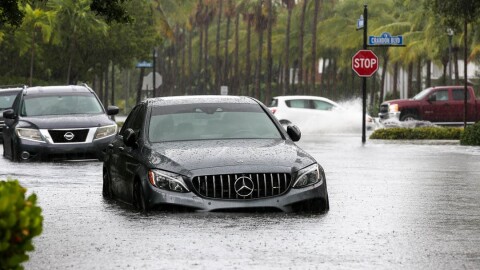-
Scientists warn that a proposed expansion of Port Everglades could cause unprecedented damage to corals in the U.S., including some of the only remaining endangered staghorn corals that survived a record-breaking heat wave.
-
A new report questions a fundamental premise of Key Biscayne’s response to climate change, suggesting that a series of limited, localized flooding projects using existing drainage lines may be preferable to the expensive course of action that the island's administration is pursuing.
-
The bears were physically checked by FWC staff and contracted bear response staff. The agency said that a full report will be released in the coming months. The FWC did not break out the data to show how many bears were killed in each of the four approved bear hunting zones or the sex of the bears killed.
-
The age-old maxim says lightning never strikes the same place twice. Florida would beg to disagree. The state is the lightning capital of the United States as measured in deaths by lightning, with four fatalities in 2025.
-
For at least one water utility in Central Florida, PFAS settlement payments are starting to arrive.
-
A study led by biology graduate student Jessica Folsom used genomic data in determining the flamingo population and its genetics in Florida and proposes strategies to restore the population.
-
The Trump administration wants to roll back protections for endangered and threatened species viewed as detrimental to economic growth. One critic says the proposals would have "destructive effects."
-
The stowaways were discovered hanging out in a leafy park on one of the world’s largest cruise ships after it left PortMiami earlier this year on a trip bound for Spain. Why the pint-sized birds that normally favor solid ground wound up sailing the high seas remains a mystery.
-
Rick Dolan, the Director of the Florida Forest Service, said firefighters typically put out about 2,000 fires a year in the state. This year so far, it's been more than 3,100.
-
The Miccosukee Tribe officials say they are moving forward with their legal battle against the "Alligator Alcatraz" immigrant detention facility in the Everglades, arguing that Florida’s acceptance of more than $600 million in federal funds for the facility represents a major concession that strengthens their case.
-
Most people who use public transit in Miami-Dade do it because they have to. But some choose it intentionally, aiming for a more sustainable lifestyle for both their health and the planet.
-
A South Florida man claims long-term use of the herbicide led to his diagnosis with non-Hodgkin's lymphoma. He is suing the product's Germany-based manufactuer, Bayer.















